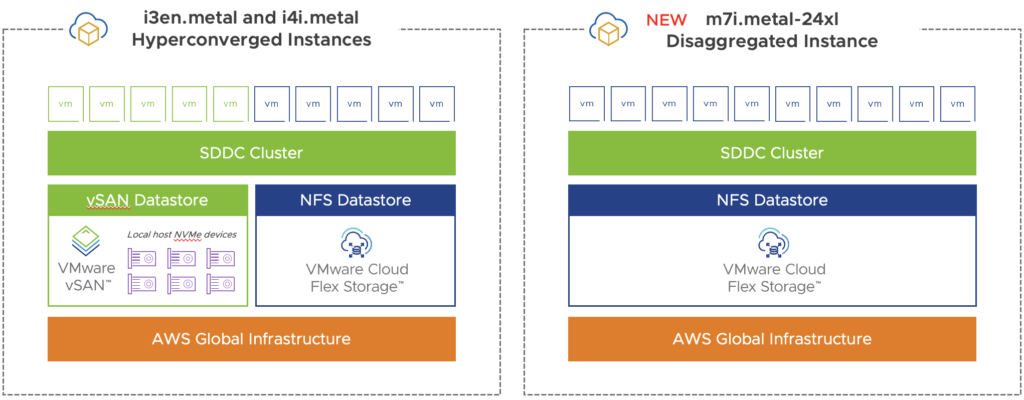Since the launch of VMware Cloud on AWS, we have been releasing only two additional type of instances: i3en.metal and i4i.metal. The i3en instance type is suited for data-intensive workloads both for storage-bound and general-purpose type of clusters. The i4i.metal released in August last year is a new generation of instances that supports memory bound and general purpose workloads like databases, VDI or mission-critical workloads.
We are proud to announce the release of a new disaggregated instance option to support new innovative use cases like Artificial Intelligence (AI) and Machine Learning (ML):
welcome to the m7i.metal-24xl instance !

With this announcement, customers will soon have the option to choose between three instance types, which include i3en.metal, i4i.metal and m7i.metal-24xl.
M7i Use Cases
Traditionally, we have offered to extend the SDDC storage capacity by adding an additional number of hosts which was not the best in term of cost optimization. In addition we have seen customers willing to add compute for certain use case or business needs without having to add more storage.
As AI (Artificial Intelligence) and ML (Machine Learning) use cases have also become crucial to businesses, driving insights, automation, and innovation, the need for specialized solutions tailored to AI/ML workloads becomes a reality. This kind of applications generates and processes vast amounts of data, requiring performant, reliable, and scalable storage architectures as well as a performant and reliable modern compute.
With the release of this new Amazon EC2 M7i instance type, we offer the capacity to scale the storage elastically and independently from the compute capacity. This will allow more flexibility in controlling the compute and storage resources.
The M7i instance itself doesn’t come with any storage and an external storage solution like VMware Cloud Flex Storage (that we announced last year) must be configured for planning the capacity of the clusters. This permits to size the storage for the real needs and avoid wasting resources and paying for unused or redundant capacity.
The other innovation coming with the m7i.metal instance is the Advanced Matrix Extensions accelerator which accelerates matrix multiplication operations for deep learning (DL) inference and training workloads.
With the solution, customers will be able to build a cost-effective infrastructure solutions and find the right balance between the storage and compute resources.
Some of the key use cases of m7i.metal-24xl instance are:
- CPU Intensive workloads
- AI/ML Workloads
- Workloads with limited resource requirements
- Ransomware & Disaster Recovery
M7i instances are ideal for application servers and secondary databases, gaming servers, CPU-based machine learning (ML), and video streaming applications.
M7i features characteristics
The M7i.metal-24xl instance type is fueled with the 4th Generation of Intel Xeon scalable processors called Sapphire Rapids with an all-core turbo frequency up to 3.9 GHz. This new generation of Intel processors feature Intel® Accelerator Engines designed to accelerate performance across the fastest-growing workloads.
Intel Processor with Advanced Matrix Extensions (Intel® AMX) accelerator can deliver significant out-of -the-box performance improvements and accelerate matrix multiplication operations for deep learning (DL) inference and training workloads (with virtual hardware 20 thanks to VMC 1.24)
It offers:
48 physical cores, 96 logical cores with Hyper Threading enabled. The cores have a base frequency of 2.4GHz with an all-core Turbo Frequency up to 3.9 GHz.
384 GiB memory
Flexible NFS storage options to choose from as per customer needs – VMware Cloud Flex Storage or Amazon FSx for NetApp ONTAP.
Up to 37.5 Gbps networking speed

It also supports always-on memory encryption using Intel Total Memory Encryption (TME)!
Both VMware Cloud Flex Storage and Amazon FSx for NetApp ONTAP are supported by M7i.metal instance and offers NFS datastores for the ESXi hosts. The size of the datastore can be tailored for the needs of applications.
The M7i.metal instances can be deployed only in Standard clusters (one AZ). Stretched clusters will be supported in further version of VMC.
In a single SDDC, you will be able to mix two different type of clusters, meaning one with M7i instances, and one with i4i.metal.
When you create a new cluster, a dedicated management datastore of 100 TiB of logical capacity is going to be deployed to store the management plane (vCenter, NSX appliances and other appliances for integrated services like HCX or VMware Recovery).
M7i customer benefits
This new instance type comes with a number of new benefits four the customers:
- Better TCO: certain use cases like Ransomware and DR requires a limited amount of compute, memory and storage, m7i.metal instance help build a more cost effective pilot light option with smaller resource configuration,
- Accelerated Performance: thanks to the Intel AMX, you can experience significant improvements for end to end data science workloads and AI models execution.
- Enhanced Scalability: provide a more flexible and scalable storage options with a storage-disaggregated instance type for customers on VMware Cloud on AWS that helps them scale storage independently from compute.
- Great Flexibility: customers can now choose between three instance types (i3en.metal, i4i.metal, m7i.metal-24xl) and different storage options to better align the infrastructure to their compute/storage needs.
This next-generation architecture for VMware Cloud on AWS enabled by an Amazon EC2 M7i bare-metal diskless instance is really bringing a lot of value to our customers. The combination of this instance with scalable and flexible storage options will help them better match application and infrastructure requirements.
If you want to know more about it and learn how it can deployed, I invite you to have a look to this video.
See you int he next Blog post!